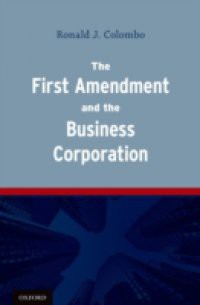The role of the business corporation in modern society is a controversial one. Some fear and object to corporate power and influence over governments and culture. Others embrace the corporation as a counterweight to the State and as a vehicle to advance important private objectives. A flashpoint in this controversy has been the First Amendment to the U.S. Constitution, which enshrines the fundamental rights of freedom to speech, religion, and association. The extent to which a corporation can avail itself of these rights goes a long way in defining the corporations role. Those who fear the corporation wish to see these rights restricted, while those who embrace it wish to see these rights recognized. The First Amendment and the Business Corporation explores the means by which the debate over the First Amendment rights of business corporations can be resolved. By recognizing that corporations possess constitutionally relevant differences, we discover a principled basis by which to afford some corporations the rights and protections of the First Amendment but not others. This is critically important, because a one-size-fits-all approach to corporate constitutional rights seriously threatens either democratic government or individual liberty. Recognizing rights where they should not be recognized unnecessarily augments the already considerable power and influence that corporations have in our society. However, denying rights where they are due undermines the liberty of human beings to create, patronize, work for, and invest in companies that share their most cherished values and beliefs.

